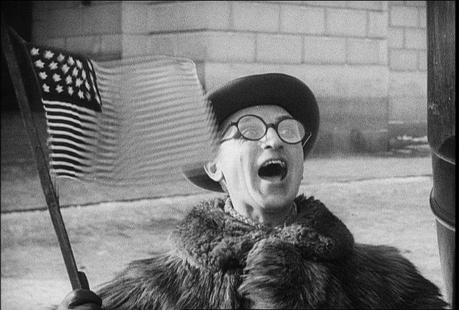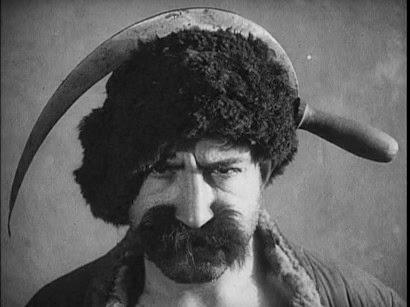
"A Yankee being punished and rewarded for his curiosity."
As both filmmaker and theorist, Lev Kuleshov ranks among cinema's great pioneers. One of his best-known films, The Extraordinary Adventures of Mr. West in the Land of the Bolsheviks (1924) is propaganda couched as slapstick comedy, extolling over Bolshevik morality over capitalist decadence. As Communist agitprop goes it's reasonably entertaining.John West (Porfiri Podobed) is an American YMCA director invited to visit Russia. Mr. West travels with his cowboy bodyguard Jeddie (Boris Barnet), fearing Bolsheviks after reading news article. His fears initially appear justified: thieves snatch his suitcase, Jeddie runs off with an American girl (Vera Lopaatina), and West falls in with three mountebanks (Sergey Komarov, Leonid Obolensky, Aleksandra Khokhlova) masquerading as aristocrats. The villains pose as Bolsheviks, planning to "rescue" West and reap the reward. Fortunately, West's employer and wife get wind of these shenanigans and summon Moscow's police to set things right.
Sergei Eisenstein's Battleship Potemkin and Strike epitomize Soviet Montage, but Lev Kuleshov is its true inventor. Cash strapped, Kuleshov cut his teeth cannibalizing existing films, reassembling them into new works. "I had to win cameramen and producers... over to the cinematograph based on montage," he later said. These threadbare conditions spurred innumerable innovations, the Kuleshov Effect being the most famous. Kuleshov also wrote The Art of the Cinema (1924) and founded the Moscow Film School, becoming an innovator in criticism. Though an accomplished director in his own right, Kuleshov remains more influential than famous.
Mr. West is a lightweight affair, cribbing liberally from Hollywood comedies. With his glasses and bumptious manner, West recalls Harold Lloyd, and the story's a socialist spin on the "innocent abroad" chestnut. Initially amusing, Mr. West settles into an endless series of slapstick brawls, eventually growing tiresome. Kuleshov isn't Charlie Chaplin, lacking that comedian's subtlety or human touch, and the set pieces pile up rather than build. The didactic last reel seems almost a relief.

"I smell dollars in the air. Feast your eyes on the American prize!"
Kuleshov fares better on a technical level. He intercuts Mr. West's experiences with bizarre fantasy/nightmare sequences: two faux-Bolsheviks roasting a woman over a fire, Jeddie's absurd antics. And Kuleshov evinces the usual Russian fascination with faces: owl-like Mr. West, all absurd glasses and constantly-opened mouth; the one-eyed villain playing with mice; a femme fatale feverishly mugging and fidgeting with her hair; the "real Bolshevik" posing nobly with a handgun. Brilliantly utilizing his own "effect," Kuleshov makes this rogue's gallery humorous instead of harrowing.Of course, Mr. West conveys a message beyond laughs. Kuleshov decries bourgeois stereotypes of Russia but isn't shy about painting Americans similarly. Cowboy Jeddie is a simpleton, head buried in a ludicrous ten-gallon hat, who reenacts a Western horse chase in the Moscow streets! As a YMCA leader, West is a rich Christian bourgeois with star-spangled stockings: a decadent triple whammy. Not to worry: West gets a tour around Moscow, impressed by Soviet universities and industrial splendor. He sends a telegram to his wife, asking that she hang a portrait of Lenin in their study!
If Mr. West holds Americans to ridicule, it's certainly not as harsh as Strike's savage anti-capitalism. The protagonist is a bumbling naif, but also tough, honest and devoted to his wife: hardly an evil oppressor. Possibly Kuleshov intended a conciliatory message: neither Americans nor Soviets should be stereotyped. Mr. West isn't necessarily malicious with its broad caricatures, merely insensitive. One imagines Russian viewers having a similar reaction to something like Ninotchka.
The Extraordinary Adventures of Mr. West in the Land of the Bolsheviks isn't an all-time classic. Crude agitprop with repetitious humor, it's nonetheless a fun find for devoted cinephiles.

